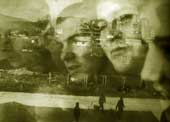 |
| Worn-out appeal: Naseeruddin Shah in The Prophet |
The production projects fine feel-good spiritual sentiments, with which I have no quarrel whatsoever. But they fit in suspiciously well with the trendy new-age transcendental art of living and power of love courses that you can enrol in to free yourself of tension if you have enough money, to listen docilely to a guru tell you that money is bad and love is good (which you should know already), after which you return home, conscience salved, and spend even more money on yourself and spew hatred on your neighbour. God knows (and all prophets) that our metropolitan lifestyles need soothing succour for stressed-out souls, but I thought Shah was made of sterner stuff.
Everyone who has gone through a Gibran phase will admit that The Prophet becomes too much of a good thing after a point; it goes round in circles and the typical oxymoronic aphorisms turn syrupy. However, Shah gives it too much respect. Instead of editing the text, he recites it faithfully from memory — his one unequivocal achievement. He does not act. Besides, his high seriousness turns off the spectators. He has only to watch experienced evangelists or our own homegrown devotional narrators to realise that disciples are hooked by brio, drama and humour. His few efforts in these directions were attractive but insufficient. Platitudinous sermonising with a grave visage makes us either restless or sleepy.
His visual concept of hospital beds, patients and staff remains an imposition, theatrical ornamentation that is nevertheless quite static. The three other actors come on merely to provide brief breaks in his solo elocution. And surely there is a more modern translation? Gibran’s version can be read, but no longer heard, owing to its quaint archaism. It reminds me of the English of his contemporary, Tagore, which cannot be spoken on stage nowadays.
The critical knife requires further sharpening for Prime Time Theatre’s Healthy, Wealthy and Vice (presented by Spandan). The two branches of Prime Time appear to have gone their separate ways. Lilette Dubey continues to experiment with thinking English theatre in Mumbai, but Calcutta’s own once-sensitive Sita Raina has most uncharacteristically opted to direct cheap-thrills theatre in Delhi. What a downfall.
To look on the bright side, at least Dinyar Contractor can rest in peace now, for in dramatist Nicholas Kharkongar he has an able successor. This young whippersnapper is obsessed with dirty jokes, many of them stale, just like old Dinyar. For the second time in Calcutta, a script by him lasts barely an hour: one could thank heaven for small mercies, but obviously he has no staying power, yet is successfully ripping off paying members of the audience. For all his claims that he is spoofing hypocritical practitioners of the Hippocratic profession, it is he who lacks scruples. His priapic doctor exploits patients, runs after women, and receives cutbacks from diagnostic clinics. Of course this may constitute satire, but Kharkongar also pokes racist fun at Africans, stereotypes homosexuals physically, and inserts an item number for voyeurs. Pure bilge.
Compared to these two damp squibs, one greets Alumnorum Societas’ amateur presentation of An Ideal Husband with a sense of relief. If Kharkongar wishes to learn the craft of witty dialogue, he just has to leaf through Oscar Wilde. In spite of the fact that Wilde’s verbal paradoxes themselves become predictable in this formulaic lesser play, they still entertain the mind. Intentionally or otherwise, this Calcutta Club production directed by Rena Ghosh captures Wilde’s target, lampooning the very people who form its society.
Thus, Piali Ray plays Mrs Cheveley as a classic femme fatale, contrasted to the impossibly virtuous Lady Chiltern (Afroze Randerian) and her goody-goody sister-in-law Mabel (Nilanjana Bose). Dipika Jaidka imparts to Lady Markby the perfect arched-brow behaviour of society ladies. One must confess that the men fare less well. Partha Ghose affects a soft but pukka accent as the Earl of Cavensham and Uday Jhala makes Goring into a nice if youthful dandy, but Arya Gupta’s grimaces as the blackmailed hero, Sir Robert Chiltern, recall Darth Vader on a good day.










